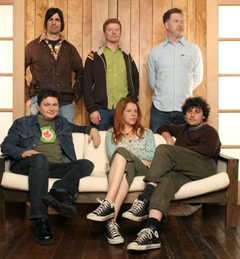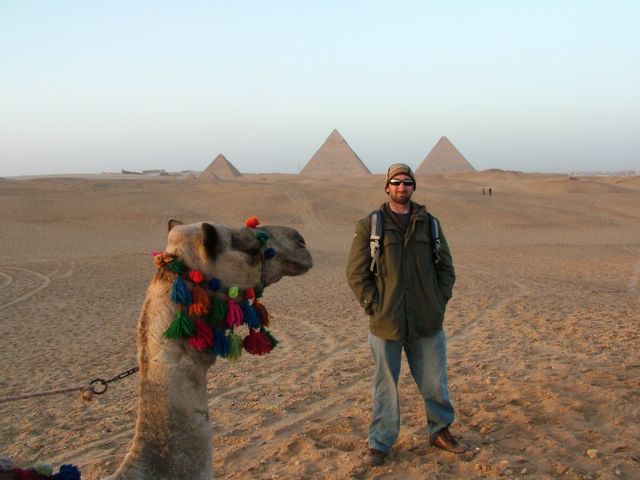A clone again, naturally
By Dave Simpson
September 30, 2005
http://www.theage.com.au/articles/2005/09/29/1127804596701.html

The real deal: Coldplay's Chis Martin.
Photo: Supplied
SO FAR, 2005 has been an exceptional year for Coldplay, with their album X&Y achieving 29 number-ones around the world. But it's also been a very good 12 months for bands who sound like them. Keane have gone from the back rooms of pubs to shifting 4.5 million albums.
Coldplay soundalikes Athlete (who used to sound like Steely Dan and were nowhere near as successful) have sold half a million copies of their Coldplay-lite album Tourist.
Keane and Athlete are what might be called surrogate bands, who sound and sometimes look similar to another, already much more successful, group. A surrogate band is signed by a label seeking a copy of something with a proven market. Right now there are so many it can seem as if we're approaching a doomsday scenario in which everyone is remaking the same handful of similar-sounding records.
There are numerous morose, David Gray-type songwriters (Damien Rice, Johnathan Rice, James Blunt, Tom Baxter). There are the spiky, shambolic Libertines-type bands (the Rakes, new Virgin signings Kooks, the Others, the Cazals).
Hordes of bands owe a bigger-than-healthy debt to Franz Ferdinand, including the Brakes, the Editors, VHS or Beta, the Departure and We Are Scientists. Much of the time, Razorlight are an eerie facsimile of the Strokes.
Other spinoffs include the bands being signed because they sound a lot like the Killers, as well as the boy bands because they're from the same management stable as a McFly or Busted.
''Sometimes I think the industry wants - and perhaps financially needs - a situation where a massive audience are buying exactly the same records," says Paul Weighell, a former A&R man.
"If they do want it, it's working. According to Amazon's "People who bought this also bought . . ." facility, records by Coldplay, Keane, Athlete and Snow Patrol sell to the same people."
Usually someone at a label will say, 'Have you seen how high X are in the charts? We need our own X!'" Weighell explains.
He signed the Levellers in the 1990s and watched as labels snapped up Levellerssounding groups.
"Old-timers used to say we didn't do this in the 1960s and early 1970s, but that's rubbish," says Weighell.
"They signed a slew of progressive bands, for example, because they knew there was a market who wanted 30-minute opuses about salads, surgery and brains!"
There's nothing new about replication - it's been going on in pop since Cliff Richard curled his lip like Elvis or the Beatles spawned the Monkees. The difference is degree. As the music market has got smaller, the cost of launching a new act (marketing, styling, videos, production) has soared. So labels play it safer more often by signing identikit acts with a supposedly proven market. It's a risky business and some in the industry are warning against a meltdown.
"A band like Franz Ferdinand are very interesting," says Andy Ross, Blur's Food Records boss in the 1990s, "but a band influenced by Franz Ferdinand are obviously going to be less interesting, and diminishing returns set in until you reach a point where pop music is over."
The strategy can also backfire.
Spiky metal types Feeder became the latest combo to undergo the Coldplay makeover, but their reception at the recent Download Festival suggested they have alienated their core audience. If cloning pop is selling like beans, it seems there are only so many varieties the market will sustain.
Generally a surrogate works best when the original is not around. Keane and Athlete profited when Coldplay were slaving away on X&Y. The Alarm - who Joe Strummer once derided as "a pale imitation of a shadow of the Clash" - had a few hits when their mentors had imploded.
A problem is that too many copies of something can damage the original. There was a time when every second band sounded like Oasis. Embrace used to be an Oasis surrogate to the point of adopting similar bravado during interviews.
They prospered as the Gallaghers' distinctiveness and creativity wavered. Eventually, both became passe. Embrace now sound like Coldplay: their recent return was on the back of a song written by Chris Martin, who himself was once considered too heavily influenced by Jeff Buckley, who in turn was a surrogate of his father, 1960s singer Tim Buckley.
"Sometimes it does feel like the whole industry is eating itself," says Ross.
It could be just another sign of the times, in the same way that fashion designers are now used to seeing their work copied on the high street. But pop culture is supposed to be above this.
Given that the music industry today is dominated by four multinational conglomerates, it's not surprising that much of their output comes down to the preferences of people at the top.
One major-label A&R man who prefers not to be named has noticed his bosses' obsessions with their own notions of "taste". He believes majors are run by people who don't actually like rock'n'roll.
"They'll happily say that Sting or the Police are their favourite acts," he whispers.
"So someone like Chris Martin comes along, who writes intelligent songs with a bit of a political leaning, and they consider that to be 'quality'. So it becomes 'What we do at this company is provide quality', and the next thing they've signed a band who sound like Coldplay and it becomes this dreadful conveyor belt."
To an extent, record companies will always respond to what's around. If kids like the Libertines, for instance, the chances are they'll pick up a guitar and sound like the Libertines, especially given that their ramshackle sound is easier for young musicians to appropriate.
What Ross finds disturbing is the "altogether higher level of cynicism a band would need to transform themselves into something as musically sophisticated as Coldplay".
At the heart of it is pop's obsession with genres. Weighell notices how we no longer ask people "What artists do you like?" but "What sort of music do you like?"
A&R men still seem particularly preoccupied with pop's trends and scenes. In the 1990s, for example, it seemed like you just had to come from Manchester to get a record deal. One story had it that entire A&R departments were sent to the Rainy City and told not to come back without one of its bands.
"That story may sound apocryphal but I was there (as Factory Records' publicist) and it did actually happen," laughs Jeff Barrett, head of Heavenly Recordings, whose latest signings are the Magic Numbers.
"They came up in coaches and signed those bands!" That's 808 State, Inspiral Carpets, My Jealous God, Mock Turtles, Northside, Intastella, the High, World of Twist, Rig and Paris Angels. Remember them all?
Probably not, because usually by the time the "next wave" or "clone" band have got their album out, the scene has moved on.
"I don't know if the industry ever learns," says Ross, who knows of at least two A&R scouts permanently camped out trying to find a Futureheads.
When Barrett came across something fresher in outsize hippyish folk-duo Magic Numbers, other A&R men asked him: "Are you sure?" "They thought they were 'out of time'," he says.
The nub is that surrogates can and do develop. Grunge queen Alanis Morissette was once a talentshow- entering disco diva. Even David Bowie started off as a derided surrogate of cabaret singer Anthony Newley. Perhaps a climate of homogeneity will provoke more wayward talents into doing something different. And when they do, the industry can cope - EMI handled Radiohead's metamorphosis from indie rockers to experimental electronic boffins with Kid A.
But perhaps the most intriguing question is whether an act could be really wily - get signed as a clone and use that platform to create something that's their own. It may have happened already. Few will remember that Blur were originally signed as a baggy band.
Their first records in 1990 and '91 had the much-copied indie-dance groove; Damon Albarn probably wouldn't broadcast this now, but he had a bowl cut and was less cool than the Mock Turtles.
But almost immediately Blur reinvented themselves from psychedelic popsters to Parklife Britpoppers to angular experimentalists - and Albarn's still doing it with the multimedia Gorillaz.
"Damon's a very intelligent character," says Ross. "I certainly wouldn't bet against him having planned it all along."
These days, Albarn even has his own almost-surrogate in the Blurish Kaiser Chiefs. Not bad for someone who began pop life as a copy of Ian Brown.
- The Guardian






